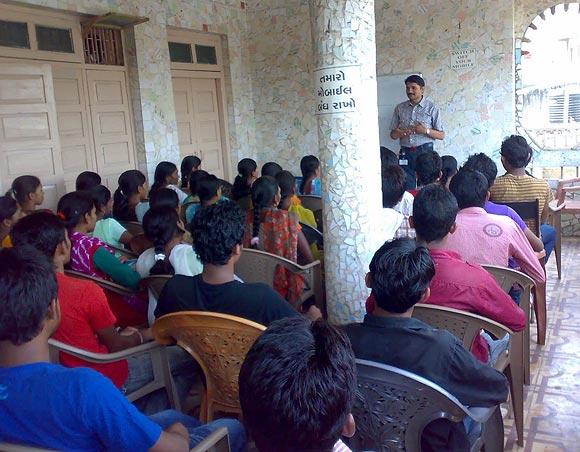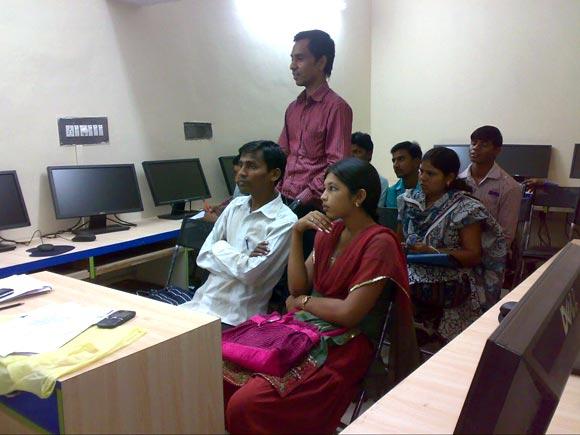
Discover how a new programme is changing the lives of thousands of young people.
Even as you read this, a quiet and remarkable revolution, in the manner India's disadvantaged get meaningful job opportunities, is under way in obscure corners of Karnataka, Andhra Pradesh, Gujarat, Jharkhand and Haryana.
This initiative -– a public-private partnership programme between state governments and the large staffing company TeamLease -- in fact looks like a solution to bridge the yawning gap that exists between job opportunities for the urban and rural youth.
Within a year of its inception, this partnership spearheaded by TeamLease Vice-President Neeti Sharma has successfully trained 6,000 candidates and employed over 5,500 of them across sectors which include retail sales, BPOs, information technology and the like, based on a candidate's aptitude and interests, bringing about, in some districts, as high as a 2,500 per cent increases in youth employment!
Sceptical?
Let's flesh these figures out for you. They will read impressive when you realise that Karnataka, for instance, which has about 30 district employment exchanges responsible for helping the unemployed find suitable jobs, offered employment to about 40 to 60 youth a year.
You read it right: 40 to 60 jobs a year.
Within a year of the partnership, Teamlease pushed the number of employed youth in Karnataka's Bijapur district from 40 to 1,600! A jump of roughly 2,500 per cent in just about a year.
What is so different about this venture that has made it an instant success?
Plenty! And there are lessons from this unique project for you too.
Unlike the government-run model which catered exclusively to public sector companies, TeamLease invited private players to host job fairs in lesser-known districts in these states.
Besides, the company converted government-run vocational training centres to offer assessment, counselling, training, certification and placement to candidates after they registered at the exchange.
The programme also roped in organisations like the Indian Institute of Job Training, IIJT, who agreed to offer free education and training to poor and deserving candidates, mostly tribals.
Divya Nair spoke with Neeti Sharma about this remarkable journey and her experience implementing this model throughout the country.

What causes unemployment in our country?
The primary reason why graduates in India are unemployable is because they lack the skills that make them job-ready.
Let me give you an example. I once met a carpenter who was looking for an assistant at his shop. When I asked him what his requirement for the position was, he said, "Find me a person who is able to hammer a nail into a given piece of wood in the first attempt. And I will teach him the rest."
Simple as it sounded, the carpenter's example emphasises the fact that job providers are looking for candidates who have the skills that the position requires. They are not looking at how much you scored in Class 10 and 12.
While academic scores may be important to secure admission to a college of your choice, job skills are different from academic proficiency.
When the candidate lacks the skills expected of him by the job provider, it leads to unemployment.
What challenges did you face while dealing with the unemployed in rural areas?
Rural areas have limited access to information. In states like Gujarat, people are content with the income they make out of farming.
Some of them who are Class 10 or 12 dropouts are not keen to travel to the city to work. Accomodation is a major concern for them. Besides, the jobs we are offering them are from private firms, which don't excite them much.
People from rural areas believe that public sector jobs are far more secure and better than private sector jobs. Even though some of them consider the offers, a good number of them later complain to us that they have to spend 50 percent of their incomes on accommodation, so they are not able to save much.
Some of them quit after three to six months, which brings up the unemployment rate. So after training them we also have to help them find jobs that are closer to home.
What inspired you to join Teamlease and work with unemployed youth?
I have been closely working with job seekers and providers for a long time now.
While studying the reports on employment and the reasons behind unemployment in our country, I realised that the 'unemployability' of an individual is the root cause of the situation and hence it was important to address unemployability in order to tackle unemployment.
If you look at India, alone, there are only two bodies that look after the employment needs of the country -- the National Human Resource Development Council and the district employment centres.
Although the government introduces new schemes every year for the benefit of the people, seldom do they reach those who need them.
The state of government-run employment exchanges are also dismal, given the fact that they are not able to match the rising demand of employment with unskilled resources.
The only way we could tackle unemployment was by training the unemployed to be job ready and by offering them the advantage of opting for private sector jobs.
How did you convince the government to allow a private staffing firm to use public employment exchanges to offer jobs in the private sector?
It took us several months of meetings and negotiations to convince the authorities that we wanted to partner with the government and make use of their schemes to help improve the rate of employment in the country.
Also, the fact that we were offering private jobs worked to our disadvantage. Eventually, when they learnt that we were using the employment exchanges as a ground to improve education, impart training and boost employment in the country, they agreed to give us an opportunity.

Why did Teamlease partner with the government if you had private jobs to offer?
While analysing the reasons behind unemployment, we realised that there are several useful employment schemes offered by the Government of India that go unnoticed by the needy, due to ignorance and lack of guidance.
We wanted to bridge that gap as well. We wanted to use the exchanges as a means to reach out to the unemployed -- identify their skills, strengths and connect them to the opportunities outside.
Although we have only been able to offer private jobs till date, we will also explore the possibility of conducting public sector job fairs in the years to come.
What do you look for in candidates?
The only requisite is that the person should be able to communicate in at least one language -- read and write.
The language need not be English -- it could well be a regional language like Gujarati or Kannada also. We enroll them to identify their aptitude, followed by professional training as per the job requirements and within a maximum of six months, the candidate is ready for employment.
Most of these jobs are retail sector jobs -- like Big Bazaar, Pantaloons and similar outlets.
Do you offer the candidate the flexibility of choosing her/his job?
Yes, we do. The aptitude test is a step in that direction.
After the initial training programme, we follow an assessment to gauge the success of the training on the individual.
Like in Andhra Pradesh, we realised that candidates were interested in working for retailers like Big Bazaar, while in Karnataka, young people opted for BPO and IT firms.
So, we try to cater to their needs and offer customised training and placements that will best meet their interests and aptitude.
Do you charge candidates to enroll for the programme?
We have flexible programmes for various candidates. There are programmes for as little as Rs 5,000 to as high as 50,000. The charges also vary according to the duration of the training.
We have tied up with the Indian Institute of Job Training to offer vocational training for candidates.
The programme is inclusive of training, assessment, counselling and placement. At the same time, if we verify that a certain candidate is unable to fund the programme, we find out if s/he can avail of a government scheme that enables free training and career development. Most tribals are given free counselling and training.

How difficult was it to convince the tribals to take up private jobs in cities?
Tribals are by far the most challenging to deal with.
The first time we held a workshop in a tribal village in Gujarat, we realised that language was a problem.
Having trained professionals doesn't help much. It was important to identify a local tribal -- one among them -- who could be trained and offered a job first.
Based on the success of this one individual, we would then request him to organise a workshop in his village where he could talk about how he gained from the activity.
This strategy helped us win the trust of villagers, who gradually agreed to attend our training programmes.

Last year, NASSCOM pointed out that 85 percent graduates in India are unemployable.
I agree that it is an alarming finding. A lot of people mistake literacy or lack of it as an influential factor. I would like to tell them that literacy is not directly linked to unemployment.
The need is to match job skills to a candidate's skills and help him find a job that is best suited to his abilities.
The problem with most technical institutes in the country that offer higher education is that the emphasis is on academic excellence.
Graduates pursuing non-professional courses like standard BA, BCom and BSc have no practical experience of functioning in a corporate environment.
Also, an increasing number of companies seek to employ job-ready graduates who can be absorbed into their organisation with minimal training.
Most employers are surprised by the fact that some of these professional graduates are unable to draft a formal letter or communicate in a professional manner.
Some of them do not care to proof-read their own CVs. These are basic skills that test a candidate. Unfortunately, most of them fail at the entry level.
What measures can educational institutes take to address this issue?
The need of the hour is to improve the efficiency of knowledge by introducing compulsory apprenticeships at every level of education. So far, only MBBS courses have been successful in implementing that effectively.
The IITs and IIMs are also successful, but we need to extend the model of 'learning-on-the-job' to other courses as well and ensure that it is a mandatory part of the curriculum.
Education institutes can partner with training centres or companies who will offer them internships for one to six months, where candidates are trained for a job they can consider after the completion of the course.
We need to have vocational training centres funded by corporate organisations within campuses to cater to these needs.

What are the common mistakes young people make at a job interview?

What advice would you offer graduates looking for jobs?